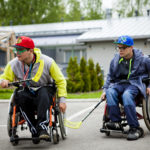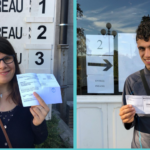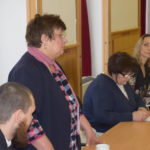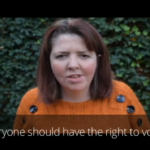The European elections in May are our topic of the year 2019!
We are talking about how to make voting accessible for people with intellectual disabilities and family members – and why it is important to vote!
Every month we interview one of our “Voting champions”: People who are active in reclaiming the right to vote, who talk to politicians about voting accessibility and who encourage others to cast their ballot.
Our Voting Champion in January is László Bercse.
 László Bercse is a Board member of Inclusion Europe and a Steering Group member of the European Platform of Self-advocates. He works with our Hungarian member ÉFOÉSZ and has been a long-standing activist for the right to vote and accessibility in all aspects of the elections process.
László Bercse is a Board member of Inclusion Europe and a Steering Group member of the European Platform of Self-advocates. He works with our Hungarian member ÉFOÉSZ and has been a long-standing activist for the right to vote and accessibility in all aspects of the elections process.
You yourself have the right to vote. But you know people who cannot vote. Can you tell me more about them?
If someone in Hungary is being placed under guardianship, the court also decides whether this person can keep their right to vote. Most people who are under guardianship also lose their right to vote.
I know self-advocates who are very sad because they are not allowed to vote. At a self-advocates’ conference one of them said: “It feels like we are not as important as others. I feel like a secondary citizen.”
Another self-advocate said: “I am really looking forward to the moment when I can go voting and have a say in what happens to me in the future.”
When you go voting, what are the things that are already working well?
It is a step forward that people can ask the National Election Office to send them an easy-to-read letter about how to vote at the elections.
And what kind of problems do you encounter?
What we really miss is easy-to-read manifestos of the different political parties. If they wrote such manifestos, it would be easier for us to be informed and decide who we want to vote for. We would also need easy-to-read voting-papers.
ÉFOÉSZ just finished an easy-to-read booklet about the European elections. What topics does the booklet talk about?
I think it is a very useful booklet! It explains in an easy-to-read format: What is the European Parliament? Why are European elections important? How to vote? What do we expect from candidates if they get elected?
One of our expectations is that all people with an intellectual disability can exercise their right to vote. We need support for voting instead of taking this right away from us. With our self-advocacy group, we have discussed the subject of voting rights many times. I also told my opinion on that matter. At the end it was my fellow self-advocate, Ilona Sallai, who gathered self-advocates’ opinion and put them in the booklet.
You can read the booklet in Hungarian language here.
ÉFOÉSZ in doing a campaign on the limited voting rights for people with intellectual disabilities. What does ÉFOÉSZ want to achieve with the campaign? How are you involved?
We have started the campaign at the end of last year. With this campaign we want to convince politicians to give the right to vote to all people with intellectual disability. We want to raise awareness with others that the current situation is not fair, because people with intellectual disabilities are citizens just like anyone else. We use social media and also mainstream media to talk about this topic. We also organise conferences and discussions on voting rights, and we are constantly addressing the subject with politicians. I take part in organising the events and provide training for self-advocates. I speak to the media on the subject regularly.
Why is it important for you to vote at the European elections?
For me it is very important to vote at the European elections. I care about who is going to represent me in the European Parliament. I would like the European Parliament to make decisions which are good for me and for other people with disabilities.






